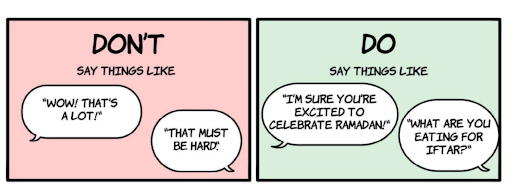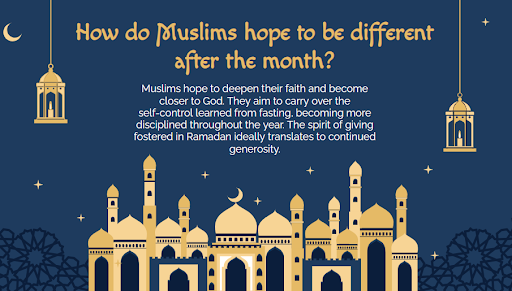When Noor Azam-Naseeruddin (‘24) took on its leadership, the Muslim Student Alliance (MSA) was still budding, the bridges of community still waiting to be built. Azam-Naseeruddin wanted to elevate the voices of Muslim girls at OHS, have conversations with the Muslim student body, and most of all, to discuss differing religious experience. Islam is not a monolith. And at a wide, international school, the MSA highlights Muslim faith as both uniting and beautifully diverse.
The affinity group, starting in the spring semester of the 2021-22 school year, had always centered dialogue — “there are discussions in chat, we post articles often too,” says upcoming 2024-25 leader Khensa Musaddequr Rahman (‘25). She’s “really excited to take it over next year,” continuing the MSA’s legacy in promoting discussion.
The MSA, Rahman says, “meets every other week, usually to check-in, or to discuss what we’re interested in.” But here at OHS, the Muslim community is especially distinctive — faith is not limited by borders, but rather existent across them. Islam is a global religion, so OHS students, international and domestic, are included in MSA-driven dialogue.
And yet despite being a global community, their experiences with Islam aren’t divisive in the slightest. Azam-Naseeruddin, a senior at OHS, stresses how the MSA features different perspectives in addition to bringing together Muslim experiences. She says that in some meetings, they’ve “discussed literature, like when we’d all read Edward Said’s After The Last Sky,” and other times they’d “have a guest speaker, with the Eid event for example.”
Rahman echoes the role of humanities in immortalizing Muslim voices, particularly with Edward Said’s novels. In the OHS English course AP ELC, she and Azam-Naseeruddin “incorporated a lot of the things that we were reading in that class to the discussions here at the MSA.” Including depictions like graphic novels, the group’s inclusion of Muslim-written literature compels dialogue — “we’ve even had discussions about Foucault’s panopticism,” Rahman says.
The two emphasize open conversation as one of the MSA’s goals. Meetings have centered questions of “whether mosques should separate based on sex, should men and women pray together, or why Muslim women wear the hijab.” While recognizing a united Muslim community, the affinity group still celebrates a varied one.
Every Muslim will have their own unique relationship to Islam, to their community, and to their mosque, the holy place of worship. Several mosques require women to pray in a separate room or downstairs, and Azam-Naseeruddin says that when joining the MSA, she “wanted to know what other young women and men” thought of gender separation, or other social topics among Muslim communities.
Especially among young Muslim women, their experience of Islam can often be through a male perspective. Mosques can be male-dominated, so it’s very rewarding to “meet other young women, modern women, who see Islam differently,” says Azam-Naseeruddin. Through spaces like the MSA, young girls at OHS, can meet others who are “excited to talk about these issues, who are interested in the controversy surrounding it.” The MSA remains a ground for these new perspectives.
Isra Boucetta (‘24), for example, is an MSA member from Algeria who has talked about “how Islam is almost celebrated where she is,” according to Azam-Naseeruddin. One of the greatest things about the MSA, Azam-Naseeruddin says, was learning how Islam is practiced all around the world, whether in Pakistan, Algeria, America, and beyond. In predominantly Muslim nations, there’s often a deep sense of religious belonging, while the experience of Islam can be entirely different in somewhere like America.
One Islamic tradition that unites Muslims internationally, however, is Ramadan, the holiest month in the Islamic calendar. It’s common for Muslims to fast during the month, from sunrise to sundown. Azam-Naseeruddin, in particular, celebrates Ramadan through giving — “I get to reconnect with my family.”
Ramadan can center connection and faith just as much as fasting itself. She says that a lot of her memories during the month are about “giving back to the community, in whatever way that is.” “My family likes helping children in India by sending food; my grandmother’s really close with a particular organization there,” she says.
Rahman, on the other hand, provides her unique perspective that enjoins religious celebration with being a student — that is, balancing schoolwork and religious obligations at once. She says that young Muslims here reflect on “both Ramadan and being students . . . a lot of the time people spend more time at the masjid or mosque.” We need to be mindful of Muslim students’ unique experience at OHS, be mindful that they often spend more time on extra worship, on all the celebration that comes with the Islamic faith.
The MSA honors the month of Ramadan through school-wide events, including Muslims and non-Muslims in the conversation. This year, MSA member Yasmeen Ali’s (‘27) father Mr. Azam Ali, an Islamic scholar himself, spoke at the annual meeting. Rahman appreciated “how much he interacted with the audience, it was such a great talk.” Azam-Naseeruddin adds that “it was nice to see more people that I hadn’t seen in a while, and also some new people too. And the Kahoot at the end is always fun.”

“Surprisingly though — I have never won, which is slightly questionable,” laughs the MSA leader.
Through open dialogue, and through events like Mr. Azam Ali’s, the breadth of Ramadan experiences is evident. Every Muslim will strengthen their connection with Islam in a unique way. Seniors like Azam-Naseeruddin have just gotten out of the college application process by the start of Ramadan, so reflecting on education, and on the future, plays a role during the month.
“Ramadan was a nice time to unwind for me, to take a step back from it. It helped me consider things more consciously,” she says. For other students, reconnecting with family centers their lives during the month.
Rahman details her experience as well. She talks about how at the masjid, it’s much more active during Ramadan, with events at iftar, the fast-breaking evening meal. “My family also bakes cookies during Ramadan, these chocolate-chip shortbread cookies that we try to make in the shape of crescents.”
What’s so important for young Muslims, whether at OHS or around the world, is that sense of belonging. Communities must be united, but diversity must also be appreciated. And with global celebrations like the month of Ramadan, new perspectives can be cherished. There’s always going to someone whose goals for Ramadan are different, whose perspective as a Muslim is individual.
In affinity groups like the MSA, OHS students are brought together on the basis of Muslim tradition. Azam-Naseeruddin and Rahman have created a space in which Islam is valued. One in which Islam is not a monolith, but a mosaic of experiences. They’ve given the belonging that so many young Muslims search for — and there couldn’t be a more noble act for our international community.

